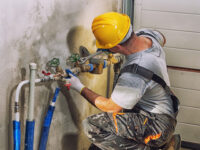The Pros and Cons of Becoming a Plumber
Plumbers Bradenton are the unsung heroes of our plumbing systems. They keep water flowing in homes and businesses, ensuring that we have access to clean water for everything from bathing to washing machines.
A career in plumbing can be rewarding and satisfying. But is it the right job for you?
Plumbing systems are vital in residential, commercial, and industrial settings. Plumbers install and repair these systems that carry water and waste in a safe and effective manner, as well as ensure they meet regulatory codes. This trade involves a variety of tasks, including laying out piping, installing fixtures and appliances such as sinks and toilets, opening clogged drains, and troubleshooting problems. Plumbers often work from ladders, scaffolding, or hydraulic man lifts, and they need to be physically strong enough to handle heavy tools and equipment.
Plumbers often need to read blueprints and other related documents to determine the best layout for piping, appliances, and fixtures. They also need to understand how these systems operate, so they can identify and fix problems. Other common duties include completing maintenance reports, documenting inspections, and responding to emergency calls.
Some plumbers specialize in particular types of systems or installations. For example, a master plumber may focus on installing and repairing heating systems. Other plumbers may focus on commercial or industrial plumbing, where they might work on large-scale systems such as those found in office buildings or factories. Plumbers who specialize in residential systems can also focus on specific fixtures and appliances, such as bathtubs or toilets.
On-call plumbers respond to emergency calls, which could involve anything from flooded basements to broken pipes and damaged appliances. These plumbers need to be able to diagnose the problem quickly and make repairs efficiently to minimize damage and disruption. These plumbers usually need to have a wide range of tools and equipment to perform their duties, from basic plumbing supplies such as pipe wrenches and soldering kits to more specialized items like hydro jets or sewer snakes.
Because plumbers are often called in to tackle urgent situations, they need to have good customer service skills. They also need to be able to explain complicated issues in a clear and concise way. This can help them keep customers happy and prevent miscommunication. In addition, plumbers need to be physically strong and fit to work in a variety of environments, from tight crawl spaces to the tops of skyscrapers.
Education and Training Requirements
To become a plumber, you must have adequate training and skills. This includes learning technical language, building codes, and tool names as well as practicing your hand-on skills. The best way to prepare for these challenges is by enrolling in a plumbing certification program that offers both classroom education and hands-on experience. It also helps to have the support of a mentor, as they can teach you valuable lessons and help you build your confidence. Punctuality is also essential in this profession, as it will reflect how you treat your customers.
While many aspiring plumbers attend a vocational training program, apprenticeships are also popular. These programs last for a few years and combine on-the-job training with classroom instruction. They also allow you to work under the supervision of experienced plumbers and gain the skills and knowledge you need to succeed on your own. You can find these programs at many community colleges or trade schools, and they often offer financial aid to qualified applicants.
After completing a vocational training program or an apprenticeship, you can take a state exam to obtain your license. However, licensing requirements vary by state, so it’s important to check with your local board for specifics. Most states have three main levels of licensure: apprentice, journeyman, and master plumber. In addition, you may need specialized training or certification for pipefitting and other fields.
Once you’ve earned your license, you can begin working as a plumber! However, it’s still important to continue your education by attending workshops and reading industry publications. This will keep you up-to-date on the latest developments in the field and enable you to adapt quickly to new situations.
Plumbers can choose from a variety of specializations, including residential, commercial, and industrial plumbing. Choosing the right specialization will allow you to focus on your strengths and interests, and it can open up more career opportunities. Plumbers with a background in pipefitting, for example, often work in construction and industrial settings, where they must handle pipes made of various materials, including steel, copper, and PVC. In addition, they may need to work in confined spaces with low oxygen levels.
Work Environment
Plumbing is a demanding career that requires a great deal of hands-on work. It also offers an excellent opportunity to earn competitive salaries. Plumbers must have a strong attention to detail and good problem-solving skills. In addition, they must be comfortable working with a variety of tools and in tight spaces.
Plumbers typically spend most of their time on-site, making repairs and installations. This means that they can work in a wide range of environments, from residential homes to commercial buildings. They may even work on plumbing systems in hospitals and other large institutions.
As a result, plumbers can experience a high level of job satisfaction. They also benefit from the ability to work at a flexible schedule, depending on the needs of their clients. Some plumbers choose to become self-employed and run their own plumbing businesses. This type of work offers greater flexibility and freedom, while also providing a higher level of income.
While many people think of residential plumbers when they think of the plumbing profession, there are actually a number of different types of plumbers. Some focus on industrial and commercial plumbing, while others specialize in specific areas such as medical gas systems. There are even some plumbers who specialize in repairing and installing fire sprinkler systems.
Regardless of the specialization, all plumbers must be familiar with local codes and regulations, plumbing history, blueprint reading, and other important details. In addition, they must be able to follow strict safety protocols when working in confined spaces or on elevated surfaces.
Once they have completed their apprenticeship, plumbers can find employment with construction companies, work for a public works department, or join a trade union. Many also choose to start their own plumbing business. In addition, some plumbers have chosen to pursue advanced education and training to become master plumbers. This allows them to offer more specialized services, oversee apprentices, and manage plumbing crews.
For those interested in a career that provides stability and excellent earning potential, plumbing may be the perfect choice. With a strong demand for skilled plumbers and affordable vocational education options like the Certificate III in Plumbing, there has never been a better time to get started in this rewarding occupation.
Salary
Many people who are interested in pursuing a career as a plumber hear the same thing: there’s always a need, they make good money and the job is secure. While these are all true, it is important to look at the pros and cons of this profession before making a final decision.
While the pay is great, it is also a physically demanding career. Plumbers often have to work in tight spaces, on ladders and in uncomfortable conditions. The job can also be dangerous if proper safety rules are not followed. Plumbers may be exposed to sewage, chemicals and other hazardous substances that can affect their health if not properly protected.
Plumbing is a great career for those who want to start earning money quickly. In comparison to other careers that require lengthy university education, plumbers can often “earn while they learn” through apprenticeship programs and begin working as soon as they are trained. This saves on student loan debt and allows new plumbers to build their savings faster.
Additionally, the pay for plumbers is quite competitive and can increase with experience and specialized skills. In addition to the above benefits, plumbing offers a sense of stability and security that is often not available in other jobs. In addition, plumbing can be a rewarding career for those who enjoy the challenge of solving problems and working with their hands.
Finally, plumbers contribute to a vital public service by maintaining the water and wastewater infrastructure. Without the work that they do, our society would not have access to clean drinking water or safe drainage systems. As a result, many plumbers find their work very satisfying and fulfilling.
So, what are you waiting for? If you have the right personality and physical condition, then a career as a plumber can be very rewarding. The only question is whether or not you are willing to put in the work and effort needed to become a successful plumber! Good luck!






